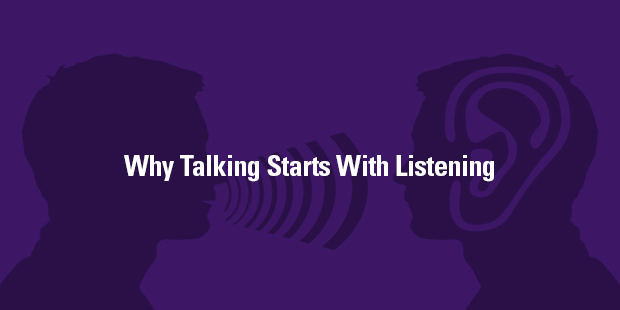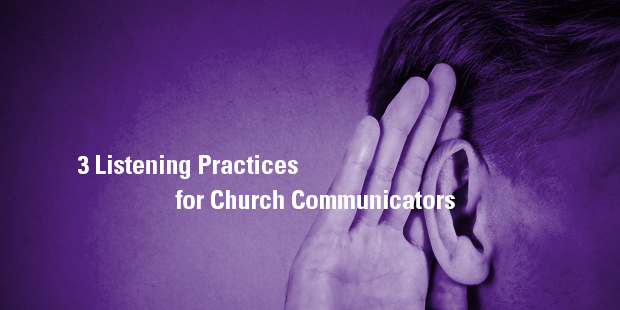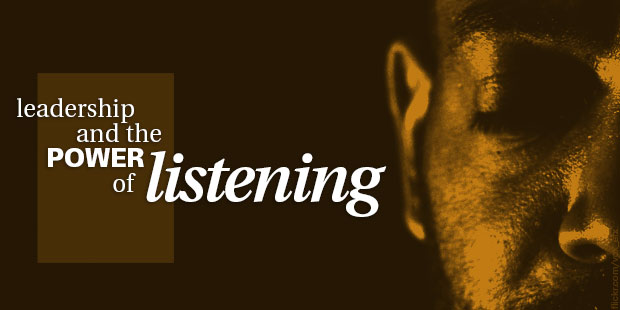
Why Talking Starts with Listening
You would think listening would be easy. After all, we spend a good chunk of our lives doing it. We listened to our parents when we were children. We listened to our teachers in school. We listen to the radio in the car, and we listen to the tv while we are watching it.
To go a step further, the Bible tells us that we ought to listen – that we ought to be “quick to listen”, in fact (James 1:19). Listening, then, is not just a skill – it’s a matter of obedience for the Christian.
But even though we have done it for so long, and even though we do it now, and even though the Bible tells us it ought to be our practice, many of us don’t. At least not really. Oh, we hear sounds, but there is a difference between hearing things that happen to be around us at a given moment and actively, intentionally listening. The first happens without effort; the second comes through discipline and practice, and this is where we often fail. We find ourselves, especially when we are hearing something or someone we don’t agree with, not really listening but instead tolerating sound, just waiting for our own chance to talk.
So what are some of the barriers that keep us from really listening to another person? Allow me to suggest three:
1. Our own insecurity.
We are all, at some level, still living middle school. We all have our own particular insecurities that are constantly in the background. We are concerned about our appearance, our intelligence, our ingenuity, or something else, and those long held insecurities affect us more than we think we do. One of the ways they do is they make us assume a posture of defensiveness. We feel attacked even if we’re not. So when we find ourselves in a conversation with someone who doesn’t think, believe, or behave as we do, we take it personally and are quick to move on that perceived attack.
When we are moving to defend ourselves, we stop listening because we feel compelled to respond, respond, respond. The deeper answer, then, to our inability to listen is not just skill development; it’s confronting our lingering insecurities through the power of the gospel. For in the gospel, we know that we are fully accepted in Christ. We are the chosen sons and daughters of God. And the confidence that comes from that knowledge, among other things, bolsters our ability to listen.
2. Our view of another person.
CS Lewis once wrote: “There are no ordinary people. You have never talked to a mere mortal. Nations, cultures, arts, civilization—these are mortal, and their life is to ours as the life of a gnat. But it is immortals whom we joke with, work with, marry, snub, and exploit—immortal horrors or everlasting splendors.” It’s easy to forget that, isn’t it?
When we are engaged in a conversation with someone we don’t agree with, we can quickly make the shift to thinking of that person as an enemy. Or a target. Or a potential opinion to change. When we do that, we stop listening because we stop focusing on that person. They have become a shell of a human – just another talking head to be responded to – rather than remembering that at the core, this person is a human being created in the image of God. When we revert back to this mindset, we are compelled to listen because really listening is a simple way we recognize the dignity that every person is rightfully due.
3. Our confidence in God’s work.
One final barrier to listening is our lack of confidence in God’s work. One of the reasons we are slow to listen and quick to speak is because we feel compelled to defend God to someone else. I want to be careful here to not imply that we should not defend God, or the Bible, or doctrine. We can, and we should. But there is a great difference in defending what we believe from the posture of confidence and defending what we believe from a posture of insecurity.
In our hearts, we might not fully believe the Bible is true. Or that God can really change hearts. Or that He is actually all powerful and all loving at the same time. We aren’t secure in His work, and so we argue, and as the saying goes, we doth protest too much and in so doing reveal we aren’t quite as secure in what we believe as we claim.
In the end, we don’t change someone’s heart. And in the end, God doesn’t need us to defend Him. In such moments, we have the opportunity to demonstrate patience, grace, and charity, and actually win a hearing for the truth of the gospel.
Listening is important. It’s more than just a skill. In fact, it might well be worth considering, if we have trouble listening, the real reason why it’s so difficult. And as we do, we will mercifully be led back to the God who never fails to listen to us. In Him, we will find the security and confidence it takes to truly listen to another.

Tags: Communication, Listening, Michael Kelley






















